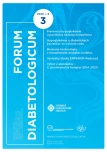Prevention of hypoglycaemia in patients treated by insulin
Authors:
Marián Mokáň; Peter Galajda
Authors‘ workplace:
I. Interná klinika JLF UK a UN Martin
Published in:
Forum Diab 2020; 9(3): 145-150
Category:
Review Article
Overview
Hypoglycaemia is limiting factor of intensive treatment of patients with diabetes mellitus. Insulin therapy, mainly during intensified regiment, is associated with higher risk of hypoglycaemia. For prevention of hypoglycaemia during insulin treatment is necessary to modify insulin doses with aim to avoid severe hypoglycaemia and to prefer treatment with lower risk of hypoglycaemia. Therapy with insulin analogs is associated with lower risk of hypoglycaemia compared to standard insulins. In indicated cases with repeated hypoglycaemia is necessary to consider the treatment by insulin pump and to use modern technology for detection of hypoglycaemia. Less strict glycaemic control is recommended in high risk patients with older age, long disease duration and present cardiovascular disease and/or microvascular complications.
Keywords:
diabetes mellitus – hypoglycaemia – insulin – insulin analogs – insulin pump
Sources
- Mokáň M, Galajda P. Hypoglykémia u pacientov s diabetes mellitus. Quick-Print: Martin 2019. ISBN 978–80–972594–5–7.
- Pathak RD, Schroeder EB, Seaquist ER et al. Severe hypoglycemia requiring medical intervention in a large cohort of adults with diabetes receiving care in U.S. Integrated Health Care Delivery Systems: 2005–2011. Diabetes Care 2016; 39(3): 363–370. Dostupné z DOI: <http://dx.doi.org(10.2337/dc15–0858>.
- Lee AK, Lee CJ, Huang ES et al. Risk factors for severe hypoglycemia in black and white adults with diabetes: The Atherosclerosis Risk in Communities (ARIC) Study. Diabetes Care 2017; 40(12): 1661–1667. Dostupné z DOI: <http://dx.doi.org/10.2337/dc17–0819>.
- Gubitosi-Klug RA, Braffett BH, White NH et al. [Diabetes Control and Complications Trial (DCCT)/ Epidemiology of diabetes interventions and complications (EDIC) research group]. Risk of Severe Hypoglycemia in Type 1 Diabetes Over 30 Years of Follow-up in the DCCT/EDIC StudyDiabetes Care 2017; 40(8): 1010–1016. Dostupné z DOI: <http://dx.doi.org/10.2337/dc16–2723>.
- Mokáň M. Hypoglykémia. Vydavateľstvo P+M: Turany 2005. ISBN 8096874268.
- [UK Hypoglycaemia Study Group]. Risk of hypoglycaemia in types 1 and 2 diabetes: effects of treatment modalities and their duration. Diabetologia 2007; 50(6): 1140–1147. Dostupné z DOI: <http://dx.doi.org/10.1007/s00125–007–0599-y>.
- Donnelly LA, Morris AD, Frier BM et al. Frequency and predictors of hypoglycaemia in type 1 and insulin-treated type 2 diabetes: a population-based study. Diabet Med 2005; 22(6): 749–755. Dostupné z DOI: <http://dx.doi.org/10.1111/j.1464–5491.2005.01501.x>.
- Weitgasser R, Lopes S. Self-reported frequency and impact of hypoglycaemic events in insulin-treated diabetic patients in Austria. Wien Klin Wochenschr 2015; 127(1–2): 36–44. Dostupné z DOI: <http://dx.doi.org/10.1007/s00508–014–0626–1>.
- Kulzer B, Seitz L, Kern W. Real-world patient-reported rates of non-severe hypoglycaemic events in Germany. Exp Clin Endocrinol Diabetes 2014; 122(3): 167–172. Dostupné z DOI: <http://dx.doi.org/10.1055/s-0033–1363688>.
- Orozco-Beltran D, Mezquita-Rava P, Ramirez de Arellano A, Galan M. Self-reported frequency and impact of hypoglycemic events in Spain. Diabetes Ther 2014; 5(1): 155–168. Dostupné z DOI: <http://dx.doi.org/10.1007/s13300–014–0057-z>.
- [American Diabetes Association]. Defining and reporting hypoglycemia in diabetes. A report from American Workgroup on Hypoglycemia. Diabetes Care 2005; 28(5): 1245–124). Dostupné z DOI: <http://dx.doi.org/10.2337/diacare.28.5.1245>.
- Martinka E, Tkáč I, Mokáň M et al. Interdisciplinárne štandardy diagnostiky a liečby diabetes mellitus, jeho komplikácií a najvýznamnejších sprievodných ochorení. Forum Diab 2018; 7( 2-S1): S75-S79.
- Martinka,E, Mokáň M, Uličiansky V et al. Konsenzuálny terapeutický algoritmus pre liečbu pomocou inzulínovej pumpy a kontinuálne meranie glykémie: v súlade s aktuálnym znením indikačných obmedzení. Forum Diab 2016; 5(2): 111–120.
- Battelino T, Conget I, Olsen B et al. The use and efficacy of continuous glucose monitoring in type 1 diabetes treated with insulin pump therapy: a randomised controlled trial. Diabetologia 2012; 55(12): 3155–3162. Dostupné z DOI: <http://dx.doi.org/10.1007/s00125–012–2708–9>.
- Pazos-Couselo M, García-López JM, González-Rodríguez M et al. High incidence of hypoglycemia in stable insulin-treated type 2 diabetes mellitus: continuous glucose monitoring vs. self-monitored blood glucose. Observational prospective study. Can J Diabetes 2015; 39(5): 428–433. Dostupné z DOI: <http://dx.doi.org/10.1016/j.jcjd.2015.05.007>.
- Levy JC, Davies MJ, Holman RR et al. Continous glucose monitoring detected hypoglycaemia in the Treating-to Target in type 2 diabetes trial (4-T). Diab Res Clin Pract 2017; 131 : 161–168. Dostupné z DOI: <http://dx.doi.org/10.1016/j.diabres.2017.01.022>.
- Bolinder J, Antuna R, Geelhoed-Dujvestijn P et al. Novel glucose sensing technology and hypoglycaemia in type 1 diabetes. A multicentre non-masked, randomised, controlled trial. Lancet 2016; 388(10057): 2254–2263. Dostupné z DOI: <http://dx.doi.org/10.1016/S0140–6736(16)31535–5>.
- De Valk HW, Lablanche S, Bosi E et al. Study of MiniMed 640G insulin pump with SmartGuard in prevention of low glucose events in adults with type 1 diabetes (SMILE): Design of a hypoglycemia prevention trial with continuous glucose monitoring data as outcomes. Diabetes Technol Ther 2018; 20(11):758–766. Dostupné z DOI: <http://dx.doi.org/10.1089/dia.2018.0222>.
- Bosi E, Choudhary P, de Valk HW et al. Efficacy and safety of suspend-before-low insulin pump technology in hypoglycaemia-prone adults with type 1 diabetes (SMILE): an open-label randomised controlled trial. Lancet DIabetes Endocrinol 2019; 7(6): 462–472. Dostupné z DOI: <http://dx.doi.org/10.1016/S2213–8587(19)30150–0>.
- Haak T, Hanaire H, Ajjan R et al. Flash glucose-sensing technology as a replacement for blood glucose monitoring for the management of insulin-treated type 2 diabetes: a multicenter, open-label randomized controlled trial. Diabetes Ther 2017; 8(1): 55–73. Dostupné z DOI: <http://dx.doi.org/10.1007/s13300–016–0223–6>.
- Carter S, Clifton PM, Keogh JP. Flash glucose monitoring for the safe use of a 2-day intermittent energy restriction in patients with type 2 diabetes at risk of hypoglycaemia: an exploratory study. Diab Res Clin Pract 2019; 151 : 138–145. Dostupné z DOI: <http://dx.doi.org/10.1016/j.diabres.2019.04.013>.
Labels
Diabetology Endocrinology Internal medicineArticle was published in
Forum Diabetologicum

Most read in this issue
- Modern technologies in treatment of diabetes mellitus
- Diabetes of exocrine pancreas
- The form matters – the benefits of metformin with sustained release
- Prof. MUDr. Andrej Dukát, CSc., FRCP, FESC, sedemdesiatročný
